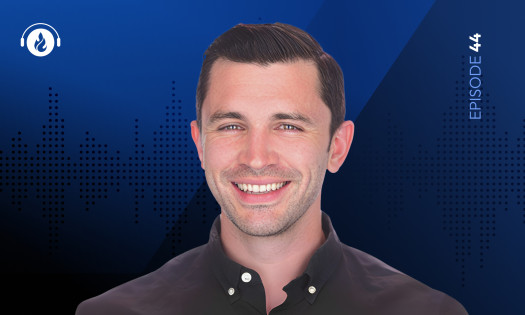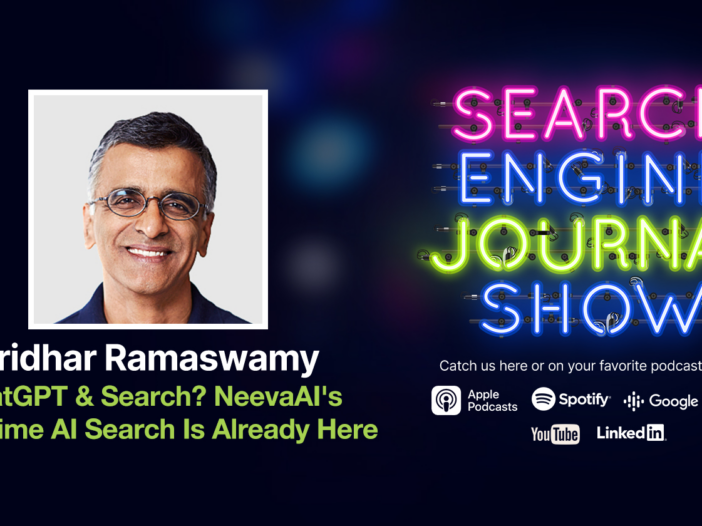Each month we evaluate and recognize award-winning designs in these industries.
Browse the best designs by category:
According to growth marketer and former HubSpot manager Alex Birkett, B2B content needs to meet four criteria to rank #1 on Google.
The 44th episode of the DesignRush Podcast explains why you should play a long-term game when it comes to SEO, as well as which indicators to look at when assessing the quality of the content on your website.
Tune in to the show to learn:
Alex is the co-founder of a content marketing & SEO agency Omniscient Digital. Before starting his agency, he worked on freemium growth at HubSpot where his team invented a new organic strategy called the “surround sound strategy” which led to Semrush building a tool based on this approach. Alex’s team drove thousands of net new freemium signups across their product suite.
In 2024, SEO isn’t just about topping search results – it’s about perfecting user experiences. With 58% of searches coming from mobile devices, the stakes for optimized, engaging content are higher than ever.
Our editor Vianca Meyer discusses with Alex how his agency approaches enabling businesses to scale their organic traffic.
Omniscient usually runs a website through a four-part audit:
LEARN MORE ABOUT SEO: 11 Types Of SEO & How They Can Improve Your Search Engine Ranking
A lot of people think about SEO audits as technical, Alex says.
You pump them through Ahrefs, SEMrush, or Screaming Frog and look at technical issues. That’s one dimension we use, but there are four in total.
One’s going to be a share of search and your visibility about competitors, topics, and the customer journey keywords – we map these out and give the business a visibility score.
Related to that is the content inventory, which I had mentioned before, and that’s gonna be your existing content assets, both the coverage of topics as well as where they fit in the customer journey.
Maybe you’re overweighted on top of funnel terms and underweighted on the bottom funnel. Maybe you’re overweighted on blog posts and underweighted on landing pages.
It’s gonna be an allocation of what kinds of content as well as the quality of the content:
Then there’s technical and UX.
We lump that into the same category because it’s based on the website infrastructure and the readability and findability, Alex notes.
Kosta Hristov, QGP’s founder and SEO lead, also believes that UX plays a major role in the success of modern SEO strategies.
“Here’s how it goes. You acquire links. Then Google gives you a spot on the first page to test your site.
Then it tracks the engagement metrics like CTR, and time on page, i.e. the UX. And if it’s not good enough, it drops you off the first page.
UX is an On-Page SEO factor that needs to be taken care of,” he shares.
Lastly, there’s off-page SEO.
So backlinks – how do you appear off-site? What are the off-page signals that show Google that you’re a reputable source? Usually, the off-page SEO of large companies is incredible, their technical SEO is off the charts. Sometimes, UX could use some work.
In the case of a recent client, the content they had published was pretty good and ranking – they just needed to publish more.
And that was one case where the solution was very simple.
You don’t need an SEO expert to say that if you don’t publish content, you’re not going to rank or attract visitors and convert them. However, we were able to quantify the largest opportunity and say don’t even touch your off-page.
Don’t even touch your technical – you can do micro tweaks as you go later on. We brought this client from their current 2/10 SEO score to a 10/10 by making them publish more content.
Don’t miss all of these keyword opportunities, Alex concludes.
With the latest algo updates, Google emphasizes user-focused content even more to ensure that the quality content that answers user needs ranks as high as possible in the SERPs.
Renowned SEO experts Daniel Foley Carter and Lily Ray previously explained this trend on the DesignRush Podcast.
Alex stresses that all serious businesses should focus their SEO efforts on the long-term game.
We’ve always indexed on the long game – We even call our podcast ‘The Long Game‘. Our core principle is to play long-term games with long-term people. As part of that, we always optimize the content for the user.
Many SEO experts chase everything Google says. Alex argues we shouldn’t care about this but stick to the SEO basics instead.
Ultimately what Google is trying to do is to align the best content to the user intent and create a good experience that allows users to use their search more, click more ads, and bring Google more revenue.
If you skip the platform, you should wonder what would the users want.
They want information from a trustworthy source – somebody who’s done this thing before, an expert. The content needs to be comprehensive and answer the question of the query. There’s search intent alignment.
Hopefully, Google will keep improving.
Alex admits there are a bunch of mid-term steps where Google ranks, for example, Forbes for best blenders. However, he still claims focusing on the long-term game is the best way to increase organic traffic in 2024.
If we look at the long game, we’re doing the right things that are going to parlay into great outcomes, regardless of what happens with Google updates or if SGE takes over.
Whatever the case is, we’re building for that long-term game.
Still, it’s often challenging to recognize where the hidden gems lie when it comes to ranking #1 on Google. An experienced SEO agency can assist every brand in doing so.
Concluding the conversation, Vianca asked Alex to explain how his agency measures the results of their SEO success and what’s the hardest part when it comes to managing client expectations.
Alex’s “simple” answer involves looking at two groups of indicators:
We’ve always been in an agency that attributes ourselves to growth outcomes, Alex confirms.
We map toward business outcomes, not just traffic outcomes. The leading indicators in the search-focused content strategy are going to be the number of indexed pages and visibility – impressions in number 1-3 search rankings and traffic. All of these metrics need to be in place to attract the traffic that’s going to convert.
An example of a lagging indicator is conversion, a qualified lead. In some cases, we have clients who have very advanced revenue and marketing operations that can help us connect data sources.
We’ve got our marketing & website analytics with GA4, and then the client might have a CRM or product analytics so we can stitch that together and say: we’ve attributed this much revenue to the content that we’re producing.
Then, we can build that based on whatever attribution model we’ve agreed on. A lot of the time, last click, sometimes first click, sometimes multi-touch, that’s getting into the weeds a little bit.
For more guides on perfecting your SEO game, check the latest trends on DesignRush.
It’s not always about revenue, Alex concludes.
Startups typically want revenue. They’re very much driven by how much money are they putting into SEO: how much money are they getting out and in what timeframe.
On the other hand, a lot of enterprises have a lot of SEO to do for their market. They’re looking at the overall visibility compared to their competitors. That’s where the share of search visibility comes into play.
We’ll always try to quantify that with an earned media value equivalent – if you were to buy this traffic, how much would that cost? It depends on what goal the client is aiming for, but we always attach it to some meaningful business metric.
If I had to draw some conclusions right now, I’d say the following:
Google’s Martin Splitt: Duplicate Content Doesn’t Impact Site Quality – Search Engine Journal
Download your copy of SEO Trends 2025 and discover what to be hopeful about in a changing search world.
Maximize your SEO efforts in 2024 with insights on Google’s SGE, algorithm updates, and expert tips to keep your site ahead.
Download this guide and learn how to optimize and manage Google Performance Max campaigns, with expert insights and actionable strategies to ensure your campaigns are effective.
Join us in analyzing 3 case studies that show the importance of driving brand search behavior and engagement, and how to do it in months, instead of years.
Join us in analyzing 3 case studies that show the importance of driving brand search behavior and engagement, and how to do it in months, instead of years.
Join us as we dive into exclusive survey data from industry-leading SEOs, digital marketers, content marketers, and more to highlight the top priorities and challenges that will shape the future of search in 2025.
Google Search Advocate clarifies that duplicate content poses operational challenges but doesn’t penalize website rankings, offering three practical solutions.
Google’s Search Central team has released a new video in its “SEO Made Easy” series. In it, Search Advocate Martin Splitt addresses common concerns about duplicate content and provides practical solutions for website owners.
Despite concerns in the SEO community, Google insists that duplicate content doesn’t harm a site’s perceived quality.
Splitt states:
“Some people think it influences the perceived quality of a site but it doesn’t. It does cause some challenges for website owners though, because it’s harder to track performance of pages with duplicates.”
However, it can create several operational challenges that website owners should address:
Splitt adds:
“It might make similar content compete with each other and it can cause pages to take longer to get crawled if this happens at a larger scale. So it’s not great and is something you might want to clean up, but it isn’t something that you should lose sleep over.”
Splitt recommends using canonical tags in HTML or HTTP headers to indicate preferred URLs for duplicate content.
While Google treats these as suggestions rather than directives, they help guide the search engine’s indexing decisions.
Splitt clarifies:
“This tag is often used incorrectly by website owners so Google search can’t rely on it and treats it as a hint but might choose a different URL anyway.”
When Google chooses different canonical URLs than specified, website owners should:
The most strategic approach involves combining similar pages to:
Splitt explains:
“If you find that you have multiple very similar pages, even if Google doesn’t consider them duplicates, try to combine them. It makes information easier to find for your users, will make reporting in Google Search Console easier to work with, and will reduce clutter on your site.”
Google Search Console may flag pages with various duplicate content notices:
These notifications indicate that Google has indexed the content, possibly under different URLs than initially intended.
Splitt addresses duplicate content in international contexts, noting that similar content across multiple language versions is acceptable and handled appropriately by Google’s systems.
He states:
“If you find that you have multiple very similar pages, even if Google doesn’t consider them duplicates, try to combine them. It makes information easier to find for your users, will make reporting in Google Search Console easier to work with, and will reduce clutter on your site.”
This guidance represents Google’s current stance on duplicate content and clarifies best practices for content organization and URL structure optimization.
See the full video below:
Featured Image: AnnaKu/Shutterstock
Matt G. Southern, Senior News Writer, has been with Search Engine Journal since 2013. With a bachelor’s degree in communications, …
Conquer your day with daily search marketing news.
Join Our Newsletter.
Get your daily dose of search know-how.
In a world ruled by algorithms, SEJ brings timely, relevant information for SEOs, marketers, and entrepreneurs to optimize and grow their businesses — and careers.
Copyright © 2024 Search Engine Journal. All rights reserved. Published by Alpha Brand Media.
SmoothSale Partners with The SEO Works for Strategic Growth – FinancialNews.co.uk
SmoothSale collaborates with The SEO Works to enhance its digital strategy.
SmoothSale, a prominent cash house-buying company in the UK, has initiated a strategic partnership with The SEO Works to manage its SEO and Digital PR strategy, alongside expert website support. This collaboration is aimed at providing homeowners with a stress-free solution for selling homes, minimising delays and ensuring transparency in service costs.
Facing an intensely competitive market, SmoothSale has relied heavily on paid advertising, notably Google Ads, until the rising costs and competition prompted the company to reconsider its current marketing strategies. They identified organic search as a promising avenue to diversify efforts, emphasising on a long-term approach that builds trust with potential clients.
SmoothSale embarked on a search for a capable digital agency that could provide comprehensive, united services to meet their evolving needs. The SEO Works, known for its expertise and a robust record in SEO, emerged as a fitting partner. They conducted a detailed audit of SmoothSale’s website and pointed out essential improvements in SEO compliance.
The SEO Works proposed a strategic campaign involving SEO, Digital PR, and comprehensive website maintenance to achieve significant results. Their detailed strategy, delivered through a cohesive service offering, cemented their position as the ideal agency for SmoothSale’s digital advancement.
Rob Harrison, director of SmoothSale, remarked, “At SmoothSale, our priority is always to make the home-selling process as quick and straightforward as possible for our customers. As the market becomes more competitive, we know it’s crucial to keep evolving. Partnering with The SEO Works gives us the opportunity to strengthen our digital presence, build trust with homeowners, and stay ahead of the curve.”
With limited historical SEO work on the SmoothSale site, the focus of the campaign is to establish a strong foundation using tried-and-tested best practices. Leveraging their award-winning SEO techniques, The SEO Works will concentrate on generating high-quality content and a digital PR link-building strategy to secure authority in search rankings. Several technical changes will also be applied by the web team, ensuring the site is optimised effectively from the ground up.
Alex Hill, sales director of The SEO Works, expressed enthusiasm for the project, “The opportunity to play a part in the growth of an exciting company such as SmoothSale is one that we will truly relish here. Helping companies stand out from the competition within the search engine results is what we do best, and I’m confident we can make this happen by following our award-winning approach.”
The partnership between SmoothSale and The SEO Works exemplifies an adaptive strategy to thrive in a competitive market through enhanced digital capabilities.
You must be logged in to post a comment.
Despite a decline in sales, Inter Ikea managed to boost its profits in 2024.Operating profit…
Amadeus House 27b Floral Street London WC2E 9DP United Kingdom
[email protected].
Get the latest creative news from FooBar about art, design and business.
Type above and press Enter to search. Press Esc to cancel.
The Trunk Trailer: Gong Yoo, Seo Hyun Jin’s K-Drama Is Packed With Mysteries – News18
The trailer for the much-anticipated Netflix K-drama The Trunk has finally been unveiled. The upcoming series stars Squid Game fame Gong Yoo and Seo Hyun Jin in the lead. Directed by Kim Kyu Tae, The Trunk is based on the same-titled novel by Kim Ryeo Ryeong. The upcoming show centres around a lonely woman Noh In Ji (Seo Hyun Jin), who is an employee of the NM (New Marriage) organisation. The job demands her to live with a “contract husband" every year. Things change when Han Jeong Won (Gong Yoo) decides to take the help of the company to save his previous marriage.
The trailer opens with Noh In Ji fixing Han Jeong Won’s bow. She tells him, “I see your former wife recommended us to you." Soon they exchange vows and start their life as a “contract couple". One day, when a mysterious trunk is recovered from a lake, Jeong Won finds out that the NM is riddled with secrets and there is more to the firm than what meets the eyes. In an interrogation room, Han Jeong Won says that the trunk’s owner is his wife. To this, the police officer asks, “Which wife" indicating a complex situation.
A post shared by Netflix K-Content (@netflixkcontent)
At one point, Han Jeong Won asks Noh In Ji what’s the point of a fake marriage. She replies, “Maybe they wish to hide their loneliness so desperately, that they are willing to cling to a facade." The trailer shows Han Jeong Won missing his actual wife dearly but as the days pass by he grows close to Noh In Ji. The video is laced with several mysteries waiting to be solved while an eerie vibe makes up for a stunning visual treat. Emotional outbursts and heavy dialogues add an extra dose of flavour.
In the closing few seconds, Noh In Ji says, “The idea of marriage disgusts me." Contradicting her point, Han Jeong Won says, “Who knows? We might be destined to be together." Dropping the trailer on Instagram, Netflix wrote, “A secret marriage service is uncovered when a trunk washes up on the shore, revealing the strange marriage between a couple in the thick of it all."
The Trunk will be streaming on Netflix from November 29.
Latest Blogs
Barry Schwartz on Covering SEO News, Productivity & How to Grow a Business [PODCAST] – Search Engine Journal
Join us in analyzing 3 case studies that show the importance of driving brand search behavior and engagement, and how to do it in months, instead of years.
Maximize your SEO efforts in 2024 with insights on Google’s SGE, algorithm updates, and expert tips to keep your site ahead.
Download this guide and learn how to optimize and manage Google Performance Max campaigns, with expert insights and actionable strategies to ensure your campaigns are effective.
Join us in analyzing 3 case studies that show the importance of driving brand search behavior and engagement, and how to do it in months, instead of years.
Join us in analyzing 3 case studies that show the importance of driving brand search behavior and engagement, and how to do it in months, instead of years.
Join us as we dive into exclusive survey data from industry-leading SEOs, digital marketers, content marketers, and more to highlight the top priorities and challenges that will shape the future of search in 2025.
Get inspired by Barry Schwartz’s exceptional work ethic, no nonsense approach to covering SEO news, and genuine dedication to our community.
Podcast: Download
Subscribe: Apple Podcast Google Podcasts Spotify
“I personally always joke around on some level that emotions get in the way of running an effective business or doing something that you need to do. If you could take out the emotion, things would be a lot smoother and easier… Not having that emotional factor does help a lot, especially when writing about stuff in our industry.”
Barry Schwartz has been consistently pumping out 5 to 10 articles per day on search since 2004.
There are days when he isn’t in the mood to write, but he does it anyway. “Who cares if I’m in the mood for it or not? I just do what I’m supposed to do.”
Barry is very much into consistency, routine, and efficiency – qualities which he says work together well in terms of doing something for a really, really long time.
After nearly 16 years of covering search and over 50,000 stories published, Barry shows no signs of slowing down. And that’s good news for the community.
In today’s edition of The Search Engine Journal Show, I talk to Barry Schwartz – an SEO pro you definitely need to know better.
Barry Schwartz is the CEO of RustyBrick, which is a New York-based web services firm.
He’s been covering the search industry for more than 15 years both as the founder of Search Engine Roundtable and he’s been the news editor for Search Engine Land since the site launched.
In the past, he was also news editor for Search Engine Watch, and he’s also been a moderator at several search marketing forums.
You can regularly see him speaking, moderating, and live blogging like a fiend at the SMX Conference series, as well as many other marketing and technology events.
In 2018, Barry was named the U.S. Search Personality of the Year at the U.S. Search Awards. And in 2019, he was awarded the Outstanding Community Services Award by Search Engine Land.
Listen to this episode and get inspired by Barry’s exceptional work ethic, no nonsense approach to covering SEO news, genuine dedication to our community, and more.
How to connect with Barry Schwartz:
Twitter | YouTube |RustyBrick | Search Engine Roundtable
Visit our podcast archive to listen to other Search Engine Journal Show podcasts!
Image Credits
Featured Image: Paulo Bobita
Danny Goodwin is the former Executive Editor of Search Engine Journal. He formerly was managing editor of Momentology and editor …
Conquer your day with daily search marketing news.
In a world ruled by algorithms, SEJ brings timely, relevant information for SEOs, marketers, and entrepreneurs to optimize and grow their businesses — and careers.
Copyright © 2024 Search Engine Journal. All rights reserved. Published by Alpha Brand Media.
ChatGPT & Search? NeevaAI’s Real-Time AI Search Is Already Here [Podcast] – Search Engine Journal
Join us in analyzing 3 case studies that show the importance of driving brand search behavior and engagement, and how to do it in months, instead of years.
Maximize your SEO efforts in 2024 with insights on Google’s SGE, algorithm updates, and expert tips to keep your site ahead.
Download this guide and learn how to optimize and manage Google Performance Max campaigns, with expert insights and actionable strategies to ensure your campaigns are effective.
Join us in analyzing 3 case studies that show the importance of driving brand search behavior and engagement, and how to do it in months, instead of years.
Join us in analyzing 3 case studies that show the importance of driving brand search behavior and engagement, and how to do it in months, instead of years.
Join us as we dive into exclusive survey data from industry-leading SEOs, digital marketers, content marketers, and more to highlight the top priorities and challenges that will shape the future of search in 2025.
Podcast: Download
Subscribe: Apple Podcast Google Podcasts Spotify
It seems like everyone these days wants to talk about artificial intelligence (AI) and its potential in search.
It’s true – there is no doubt that AI will continue revolutionizing how we find information online. But did you know that real-time AI search is already here? Introducing NeevaAI, it harnesses the power of artificial intelligence for more efficient search results in real time.
Neeva CEO and ex-Head of Google Ads, Sridhar Ramaswamy, joined me on the SEJ Show to discuss how live AI questions and answers will change how people search. We touched on how AI will alter the business models of search engines. And also covered the limitations of ChatGPT, and the importance of sourcing and citations in AI-powered live search-driven answers.
We felt that commercial search engines, Google, and Bing, had become products for advertisers, not products for you and me to find out what we want. We felt that a user-focused search engine could differentiate itself and deliver a better product experience. So Neeva, at its core, is a user-first search engine. That means that we don’t show ads, don’t show affiliate links, and we protect your privacy. –Sridhar Ramaswamy, 02:03
NeevaAI seemed to fix most of the issues I was experiencing with chatGPT, especially the lack of sourcing and accurate information.
–Loren Baker, 35:30
The underlying technology behind chatGPT is this model called GPT-3.5. The core technique that that model uses is learning on every page, every piece of text that it can get its hands on. Now note they don’t know where these pages came from. They don’t know whether it is real or not. They don’t understand things like link structure authority. –Sridhar Ramaswamy, 06:41
[00:00] – About Sridhar.
[05:29] – Limitation of ChatGPT.
[10:17] – A walkthrough on Neeva’s AI search.
[17:35] – Monetization challenges ad-supported search engines may face with AI.
[21:24] – How verified sources are served.
[23:48] – How personalized are AI-driven answers based on history?
[24:54] – Will there be more follow-up queries after the AI results are given?
[27:43] – Where this is going in terms of privacy.
[35:30] – Is Neeva available in multiple languages?
[37:12] – Can website owners verify with Neeva, like Google Search Console?
Resources mentioned:
Neeva: ad-free private search: https://neeva.com/
All of us, willingly or not, are participating in a giant experiment similar to Google. We are happily submitting our thoughts, worries, and desires to chatGPT. And worse, it is not equipped to compartmentalize information like Google reasonably can. Google’s like, okay, this is your account, these are your searches, you want to delete it, tell me. We’ll delete it. They make it hard for you to do it, but it is possible. So I think there needs to be oversight over how this is done. What storing personal information is going to mean? If the data is then used for training future models, that’s when life gets very scary.–Sridhar Ramaswamy, 32:50
One of the main points of concern that I’ve had with some peers while discussing AI is real-time answers. This could be a direct negative on the traditional Google search monetization model.–Loren Baker, 15:59
Lack of authority is a huge issue. Also, these models are humongous. They take an enormous amount of money to train and an enormous amount of money to run, and they’re not real-time. So what we do at Neeva is we use a technique called retrieval, augmented generation. That’s a fancy way of saying to use the power of search to set the reality field for a large language model. Then, ask it to generate text and cite which part of the input text it uses.–Sridhar Ramaswamy, 08:27
For more content like this, subscribe to our YouTube channel: https://www.youtube.com/user/searchenginejournal
Connect with Sridhar Ramaswamy
Sridhar Ramaswamy is an inspiring example of using technology for the greater good. After leading Google’s enormous advertising division, he succeeded as a venture capitalist at Greylock Partners.
He then took his ambitions one step further with Neeva. This privacy-focused search engine has no ads and runs on a subscription-based model instead.
This tech master combines humanistic values with revolutionary thinking to make the software work towards beneficial societal outcomes. With such ambition inspiring him forward, this entrepreneur has set down new paths of discovery. As a result, we can all benefit from Sridhar’s tireless vision for innovation!
Connect with Sridhar on LinkedIn: https://www.linkedin.com/in/nancy-marzouk-82519a/
Follow him on Twitter: https://twitter.com/RamaswmySridhar
Connect with Loren Baker, Founder of Search Engine Journal:
Follow him on Twitter: https://www.twitter.com/lorenbaker
Connect with him on LinkedIn: https://www.linkedin.com/in/lorenbaker
Loren Baker is the Founder of SEJ, an Advisor at Alpha Brand Media and runs Foundation Digital, a digital marketing …
Conquer your day with daily search marketing news.
Join Our Newsletter.
Get your daily dose of search know-how.
In a world ruled by algorithms, SEJ brings timely, relevant information for SEOs, marketers, and entrepreneurs to optimize and grow their businesses — and careers.
Copyright © 2024 Search Engine Journal. All rights reserved. Published by Alpha Brand Media.





